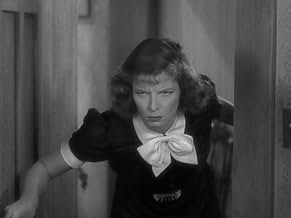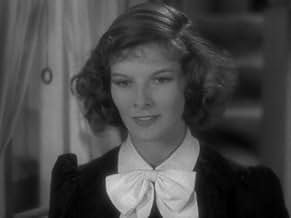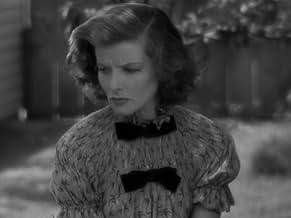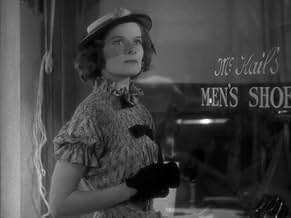IMDb RATING
6.8/10
4.8K
YOUR RATING
A working-class girl is thwarted and embarrassed in her attempts to move up socially by her gauche family and unstable father.A working-class girl is thwarted and embarrassed in her attempts to move up socially by her gauche family and unstable father.A working-class girl is thwarted and embarrassed in her attempts to move up socially by her gauche family and unstable father.
- Nominated for 2 Oscars
- 4 wins & 3 nominations total
Hattie McDaniel
- Malena
- (as Hattie McDaniels)
Brooks Benedict
- Henrietta's Dance Partner
- (uncredited)
Harry Bowen
- Laborer Putting Up Sign
- (uncredited)
Steve Carruthers
- Party Guest
- (uncredited)
Monte Carter
- Waiter at Restaurant
- (uncredited)
George Ford
- Party Guest
- (uncredited)
Joe Gilbert
- Party Guest
- (uncredited)
Featured reviews
ALICE ADAMS is the film I'd heard about for years as one of Hepburn's best early films so when I had the chance to watch it recently on TCM I took advantage of it.
From a novel by Booth Tarkington, it concerns a young woman anxious to connect socially with the right people who manages to attract the attention of a handsome and well-to-do young man (Fred MacMurray) at a party. Hepburn shines in the title role, looking fresh and attractive, struggling to keep him interested in her--but unfortunately, with all of her trademark mannerisms not always held in check.
She does well in the role but, in my opinion, the real magnet of interest is the under-appreciated Fred MacMurray who does a sincere and effortless job as her suitor in a role that could not have been easy to bring off. Both stars are in their physical prime, but MacMurray's naturalness only makes Hepburn look even more mannered than usual. Fortunately, this works because her character is supposed to be putting on airs. But at times, this is overdone.
The awkwardness of the social situations are exploited--and the highpoint has to be the warm dinner served on a hot evening, complete with maid service (by Hattie McDaniel) in one of the movie's most amusing, if uncomfortable, scenes. Here too, MacMurray displays just the right amount of stability against all odds. Fred Stone provides a number of chuckles as Hepburn's so provincial father.
All of the supporting roles are nicely filled, with special praise for Ann Shoemaker as the concerned mother anxious for her daughter to find the right suitor. But it's Hepburn's showcase under George Stevens' sensitive direction and she is convincing despite the overly mannered performance.
Summing up: Although some of the situations seemed a bit forced and not everyone will appreciate the humor at Hattie McDaniel's expense, it's worth watching for Hepburn and MacMurray alone.
From a novel by Booth Tarkington, it concerns a young woman anxious to connect socially with the right people who manages to attract the attention of a handsome and well-to-do young man (Fred MacMurray) at a party. Hepburn shines in the title role, looking fresh and attractive, struggling to keep him interested in her--but unfortunately, with all of her trademark mannerisms not always held in check.
She does well in the role but, in my opinion, the real magnet of interest is the under-appreciated Fred MacMurray who does a sincere and effortless job as her suitor in a role that could not have been easy to bring off. Both stars are in their physical prime, but MacMurray's naturalness only makes Hepburn look even more mannered than usual. Fortunately, this works because her character is supposed to be putting on airs. But at times, this is overdone.
The awkwardness of the social situations are exploited--and the highpoint has to be the warm dinner served on a hot evening, complete with maid service (by Hattie McDaniel) in one of the movie's most amusing, if uncomfortable, scenes. Here too, MacMurray displays just the right amount of stability against all odds. Fred Stone provides a number of chuckles as Hepburn's so provincial father.
All of the supporting roles are nicely filled, with special praise for Ann Shoemaker as the concerned mother anxious for her daughter to find the right suitor. But it's Hepburn's showcase under George Stevens' sensitive direction and she is convincing despite the overly mannered performance.
Summing up: Although some of the situations seemed a bit forced and not everyone will appreciate the humor at Hattie McDaniel's expense, it's worth watching for Hepburn and MacMurray alone.
I had heard of the famous Tarkington novel (but not read it) and had known that Katherine Hepburn won the Best Actress Oscar for this. So, I rented it.
It's just so moving. What I think some of the negative reviewers forget is just how much a girl's prospects in a small town in the 1920s are determined by whom she marries. For the intelligent, lively, vibrant, charming, warm-hearted Alice Adams - with a pitifully weak (but very sympathetic) and rather poor father, Alice's chance to "make anything" of her life is determined socially.
My heart ached with the snubs Alice receives - the routine unthinking cuts she receives at the hands of those from "better" families. Wearing a two year old dress with a corsage of violets illegally picked from the park, her loutish brother in his old beaten-up borrowed car as her date, she tries SO HARD to fit in - and doesn't because no one will let her. It's the most opaque of glass ceilings.
If you've ever felt (at a job, a party, a family gathering) that there was nothing you could do - no matter how hard you tried - to fit in - yet it was important that you did, you'll feel so much for this charming girl.
I do agree with others that the Arthur Russell part is underwritten.
But the movie boring? Not on your life. The painful moments are more difficult to watch than most war movies in which the protagonist is killed - because it is so well-done -
-- the pains of humiliation borne within, the disability one cannot hide, the old dress, the rude and outrageous relation, the thwarted eagerness - these are far more likely to be the painful moments in one's life (that one does not wish to remember) than any actual bullet wounds.
I love how the movie does not show a saintly Alice - she would love to snub others (e.g., the chubby boy at the dance), would love to parade before others in finery. yet her warmth toward her family - her essential sweetness, her strong frustrated yearning - are completely captivating.
We love this girl - and because of that, we love the movie.
It's just so moving. What I think some of the negative reviewers forget is just how much a girl's prospects in a small town in the 1920s are determined by whom she marries. For the intelligent, lively, vibrant, charming, warm-hearted Alice Adams - with a pitifully weak (but very sympathetic) and rather poor father, Alice's chance to "make anything" of her life is determined socially.
My heart ached with the snubs Alice receives - the routine unthinking cuts she receives at the hands of those from "better" families. Wearing a two year old dress with a corsage of violets illegally picked from the park, her loutish brother in his old beaten-up borrowed car as her date, she tries SO HARD to fit in - and doesn't because no one will let her. It's the most opaque of glass ceilings.
If you've ever felt (at a job, a party, a family gathering) that there was nothing you could do - no matter how hard you tried - to fit in - yet it was important that you did, you'll feel so much for this charming girl.
I do agree with others that the Arthur Russell part is underwritten.
But the movie boring? Not on your life. The painful moments are more difficult to watch than most war movies in which the protagonist is killed - because it is so well-done -
-- the pains of humiliation borne within, the disability one cannot hide, the old dress, the rude and outrageous relation, the thwarted eagerness - these are far more likely to be the painful moments in one's life (that one does not wish to remember) than any actual bullet wounds.
I love how the movie does not show a saintly Alice - she would love to snub others (e.g., the chubby boy at the dance), would love to parade before others in finery. yet her warmth toward her family - her essential sweetness, her strong frustrated yearning - are completely captivating.
We love this girl - and because of that, we love the movie.
Have you ever picked up what you thought was a glass of water, but when you took a long sip you ended up with a mouthful of Sprite? A surprising feeling, but then you have to figure out if it's pleasant or not. I felt similarly about my experience watching "Alice Adams", George Stevens' 1935 film starring Katherine Hepburn as the title character. Expecting a wily romantic comedy, possibly a precursor to Hepburn's screwball comedies, I instead witnessed a beautiful, touching and sad film about rejection and romance in small-town America.
Alice is the daughter of a bookkeeper who is sick, and therefore temporarily out of work. Even before his unemployment, his job did not provide as much money for his family as many of Alice's contemporaries. This causes Alice to not be accepted in society, and makes it harder to find a boyfriend, though she tries to keep cheerful in front of her family. Unfortunately Mrs. Adams doesn't make things easier, by constantly harping on Mr. Adams to quit his job and be more ambitious. When the Palmers have their annual dance, Alice asks her brother Walter to take her, and there she first sees Arthur Russell MacMurray) a wealthy young man who is practically engaged to Mildred Palmer, probably the richest and most socially prominent young woman in the town. He notices Alice, and after a dance together, finds her a couple of days later and they begin a romance, but it becomes obvious that Alice is not going to be able to put up a façade of wealth and social acceptance for long, as their relationship becomes more serious.
There were so many times that I found myself just aching for Alice during this film. Booth Tarkington is so good at capturing the darker side of small town life without being obvious, that it is understandable that this film could be mistaken for a light romantic comedy, though in reality it was anything but. Alice's low self-esteem, mainly due to society's views on her more than her family's lack of money makes her such a fragile character that she becomes immediately sympathetic, and this is mainly due to Hepburn's performance. This was early in her career, and after seeing many of her later films it is easy to forget just how radiant and luminous she once was. She has always been one of my favorite actresses, but it was generally because of the strength she gave the characters she played throughout the years, not her fragility. "Alice Adams" was an extremely pleasant surprise, and I ended up absolutely loving it. A very solid 8/10.
--Shelly
Alice is the daughter of a bookkeeper who is sick, and therefore temporarily out of work. Even before his unemployment, his job did not provide as much money for his family as many of Alice's contemporaries. This causes Alice to not be accepted in society, and makes it harder to find a boyfriend, though she tries to keep cheerful in front of her family. Unfortunately Mrs. Adams doesn't make things easier, by constantly harping on Mr. Adams to quit his job and be more ambitious. When the Palmers have their annual dance, Alice asks her brother Walter to take her, and there she first sees Arthur Russell MacMurray) a wealthy young man who is practically engaged to Mildred Palmer, probably the richest and most socially prominent young woman in the town. He notices Alice, and after a dance together, finds her a couple of days later and they begin a romance, but it becomes obvious that Alice is not going to be able to put up a façade of wealth and social acceptance for long, as their relationship becomes more serious.
There were so many times that I found myself just aching for Alice during this film. Booth Tarkington is so good at capturing the darker side of small town life without being obvious, that it is understandable that this film could be mistaken for a light romantic comedy, though in reality it was anything but. Alice's low self-esteem, mainly due to society's views on her more than her family's lack of money makes her such a fragile character that she becomes immediately sympathetic, and this is mainly due to Hepburn's performance. This was early in her career, and after seeing many of her later films it is easy to forget just how radiant and luminous she once was. She has always been one of my favorite actresses, but it was generally because of the strength she gave the characters she played throughout the years, not her fragility. "Alice Adams" was an extremely pleasant surprise, and I ended up absolutely loving it. A very solid 8/10.
--Shelly
I suppose that no one ever gave Alice Adams the sage advice that when one goes on a date with somebody, you should just "be yourself." But in the 1935 film "Alice Adams," Katharine Hepburn's title character is too busy trying to hide her humble background and put on hoity-toity airs, whenever she goes out shopping, to a party and especially when being courted, to EVER really be herself, and this desire to climb that social ladder only leads to embarrassing predicaments. This is actually a very charming film, and Hepburn, 28 here, looks extremely pretty, especially when given any number of beautiful close-ups by director George Stevens. The film boasts two wonderful and heartbreaking scenes: an early sequence at a ritzy dance, where wallflower Alice hugs the sidelines while pretending to no one in particular that everything is fine, and a late scene, in which the well-to-do young courter who has taken a fancy to her (nicely played by Fred MacMurray) suffers through a formal dinner with Alice's family in the middle of a heat wave. Hattie McDaniel (listed here as "McDaniels") almost steals this dinner scene as a slovenly, gum-chewing maid. Alice, despite her tendency to put on airs, is at heart a sweet girl (we see that in her relationships with her parents and brother), and the viewer is grateful that a young man is able to see beyond her B.S. and discern her finer qualities. But will upper-class Fred accept Alice, once he learns of her background? That, my IMDb'er friend, I urge you to find out for yourself...
I am NOT a fan of Katharine Hepburn....but I really like her in this film. I don't think she ever looked cuter and was more appealing. One often forgets the fresh face and beauty she had when she was young.
This film starts off wonderfully for 20 minutes, then bogs down a bit for an hour and then rallies brilliantly in the last 20 minutes. That last part is so good that made the film not only worthwhile to view but one to keep and watch every few years.
It bogs down when Hepburn starts her deceiving scheme and nervously yaks and yaks and yaks trying to impress her boyfriend (Fred MacMurray). The deceit involves her trying to hide her social status, something that must have meant a lot more back in the early '30s than it does today.
Critics comment about how the dinner scene is a "classic" and the highlight of the film, but I didn't think it was all that great, although Hattie McDaniel is funny. It's what happened afterward that made it a memorable film to me.
Although Hepburn and Fred MacMurray are the stars of this romance-comedy, Fred Stone almost steals the show. Playing Hepburn's dad in the film, he was both hilarious at times and very sad....and always interesting. He gives an unbelievably powerful speech to his boss near the end of this film.
Another plus for "Alice Adams" is the direction. This is early George Stevens, but just about any film that man directed is top-notch, including this one.
Without giving away what happens in the story, the film does present a nice message of forgiveness and reconciliation and sports one of the stronger feel-good endings I've ever seen on film. Hepburn's last words in the movie are "Gee Whiz!!" That bygone innocent reaction to MacMurray's comment that he loved her says a lot about how movies and times have changed.
This film starts off wonderfully for 20 minutes, then bogs down a bit for an hour and then rallies brilliantly in the last 20 minutes. That last part is so good that made the film not only worthwhile to view but one to keep and watch every few years.
It bogs down when Hepburn starts her deceiving scheme and nervously yaks and yaks and yaks trying to impress her boyfriend (Fred MacMurray). The deceit involves her trying to hide her social status, something that must have meant a lot more back in the early '30s than it does today.
Critics comment about how the dinner scene is a "classic" and the highlight of the film, but I didn't think it was all that great, although Hattie McDaniel is funny. It's what happened afterward that made it a memorable film to me.
Although Hepburn and Fred MacMurray are the stars of this romance-comedy, Fred Stone almost steals the show. Playing Hepburn's dad in the film, he was both hilarious at times and very sad....and always interesting. He gives an unbelievably powerful speech to his boss near the end of this film.
Another plus for "Alice Adams" is the direction. This is early George Stevens, but just about any film that man directed is top-notch, including this one.
Without giving away what happens in the story, the film does present a nice message of forgiveness and reconciliation and sports one of the stronger feel-good endings I've ever seen on film. Hepburn's last words in the movie are "Gee Whiz!!" That bygone innocent reaction to MacMurray's comment that he loved her says a lot about how movies and times have changed.
Did you know
- TriviaThough Bette Davis won the 1935 Academy Award/Oscar for L'Intruse (1935) beating out Katharine Hepburn in Désirs secrets (1935), Davis was noted for saying more than once that she didn't deserve the award that year and that the one who did was Katharine Hepburn.
- GoofsWhen Alice walks with Arthur toward her house for the first time, a woman watering her shrubs can be seen and a letter carrier walks up, then back down her porch steps twice. The background scene repeats itself, letter carrier, woman setting down hose, etc. The letter carrier approaches Alice moments later where she then has to shamefully admit to Arthur that this is, indeed, her house that she is in front of. Likely a rear projection scene that was duplicated.
- Quotes
Mrs. Adams: Malena fell down the cellar stairs!
Virgil Adams: Did she break any of our things?
- ConnectionsFeatured in George Stevens: A Filmmaker's Journey (1984)
Details
- Runtime1 hour 39 minutes
- Color
- Aspect ratio
- 1.37 : 1
Contribute to this page
Suggest an edit or add missing content




































